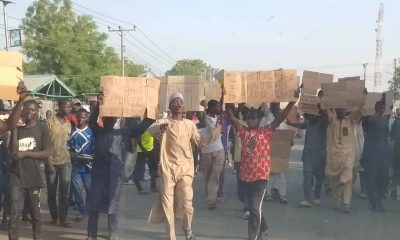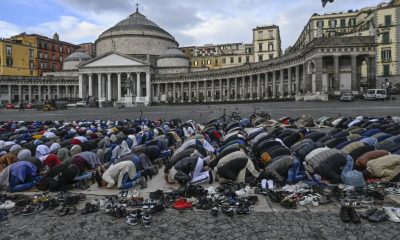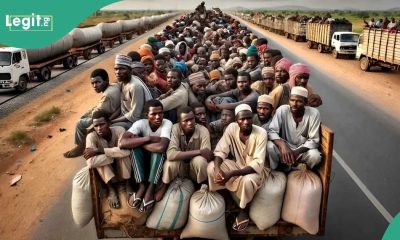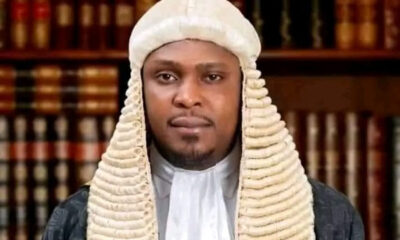International
Zelenskyy: Russians create ‘complete disaster’ with mines

Ukrainian President Volodymyr Zelenskyy warned his people early Saturday that retreating Russian forces were creating “a complete disaster” outside the capital as they leave mines across “the whole territory,” including around homes and corpses.
He issued the warning as the humanitarian crisis in the encircled city of Mariupol deepened, with Russian forces blocking evacuation operations for the second day in a row. Meanwhile, the Kremlin accused the Ukrainians of launching a helicopter attack on a fuel depot on Russian soil.
Ukraine denied responsibility for the fiery blast, but if Moscow’s claim is confirmed, it would be the war’s first known attack in which Ukrainian aircraft penetrated Russian airspace.
“Certainly, this is not something that can be perceived as creating comfortable conditions for the continuation of the talks,” Kremlin spokesman Dmitry Peskov said, five weeks after Moscow began sending upwards of 150,000 of its own troops across Ukraine’s border.
Russia continued withdrawing some of its ground forces from areas around Kyiv after saying earlier this week it would reduce military activity near the Ukrainian capital and the northern city of Chernihiv.
“They are mining the whole territory. They are mining homes, mining equipment, even the bodies of people who were killed,” Zelenskyy said in his nightly video address to the nation. “There are a lot of trip wires, a lot of other dangers.”
Ukraine’s military said it had retaken 29 settlements in the Kyiv and Chernihiv regions.
Still, Ukraine and its allies warned that the Kremlin is not de-escalating to promote trust at the bargaining table, as it claimed, but instead resupplying and shifting its troops to the country’s east. Those movements appear to be preparation for an intensified assault on the mostly Russian-speaking Donbas region in the country’s east, which includes Mariupol.
Zelenskyy warned of difficult battles ahead as Russia redeploys troops. “We are preparing for an even more active defense,” he said.
He did not say anything about the latest round of talks, which took place Friday by video. At a round of talks earlier in the week, Ukraine said it would be willing to abandon a bid to join NATO and declare itself neutral — Moscow’s chief demand — in return for security guarantees from several other countries.
READ ALSO:
- APC transition committee probes party’s finances after Buni’s exit
- Arrest anyone enforcing sit-at-home in Anambra, IPOB tells Soludo
- Train Attack: Kaduna Receives Luggage Of 100 Affected Passengers
The invasion has left thousands dead and driven more than 4 million refugees from Ukraine.
Mariupol, the shattered and besieged southern port city, has seen some of the worst suffering of the war. Its capture would be a major prize for Russian President Vladimir Putin, giving his country an unbroken land bridge to Crimea, seized from Ukraine in 2014.
On Friday, the International Committee for the Red Cross said it was unable to carry out an operation to bring civilians out of Mariupol by bus. City authorities said the Russians were blocking access to the city.
“We do not see a real desire on the part of the Russians and their satellites to provide an opportunity for Mariupol residents to evacuate to territory controlled by Ukraine,” Petro Andryushchenko, an adviser to Mariupol’s mayor, wrote on the Telegram messaging app.
He said Russian forces “are categorically not allowing any humanitarian cargo, even in small amounts, into the city.”
Around 100,000 people are believed to remain in the city, down from a prewar 430,000. Weeks of Russian bombardment and street fighting have caused severe shortages of water, food, fuel and medicine.
“We are running out of adjectives to describe the horrors that residents in Mariupol have suffered,” Red Cross spokesperson Ewan Watson said.
On Thursday, Russian forces blocked a 45-bus convoy attempting to evacuate people from Mariupol and seized 14 tons of food and medical supplies bound for the city, Ukrainian authorities said.
Zelenskyy said more than 3,000 people were able to leave Mariupol on Friday.
He said he discussed the humanitarian disaster with French President Emmanuel Macron by telephone and with the president of the European Parliament, Roberta Metsola, during her visit to Kyiv.
“Europe doesn’t have the right to be silent about what is happening in our Mariupol,” Zelenskyy said. “The whole world should respond to this humanitarian catastrophe.”
Elsewhere, at least three Russian ballistic missiles were fired late Friday at the Odesa region on the Black Sea, regional leader Maksim Marchenko said. The Ukrainian military said the Iskander missiles did not hit the critical infrastructure they targeted.
Odesa is Ukraine’s largest port and the headquarters of its navy.
As for the fuel depot explosion, Russian Defense Ministry spokesman Igor Konashenkov said two Ukrainian helicopter gunships flew in extremely low and attacked the civilian oil storage facility on the outskirts of the city of Belgorod, about 25 kilometers (16 miles) from the Ukraine border.
The regional governor said two workers at the depot were wounded, but the Rosneft state oil company denied anyone was hurt.
Oleksiy Danilov, secretary of Ukraine’s national security council, said on Ukrainian television: “For some reason they say that we did it, but in fact this does not correspond with reality.”
Later, in an interview with Fox, Zelenskyy refused to say whether Ukraine was behind the attack.
On the outskirts of Kyiv, where Russian troops have withdrawn, damaged cars lined the streets of Irpin, a suburban area popular with young families, now in ruins. Emergency workers carried elderly people on stretchers over a wrecked bridge to safety.
Three wooden crosses next to a residential building that was damaged in a shelling marked the graves of a mother and son and an unknown man. A resident who gave her name only as Lila said she helped hurriedly bury them on March 5, just before Russian troops moved in.
“They were hit with artillery and they were burned alive,” she said.
n Irpin resident who gave his name only as Andriy said the Russians packed up their equipment and left on Tuesday. The next day, they shelled the town for close to an hour before Ukrainian soldiers retook it.
“I don’t think this is over,” Andriy said. “They will be back.”
Associated Press
International
Democrats drag Trump to court over election overhaul order

Democrats drag Trump to court over election overhaul order
The Democratic Party has sued the Trump administration over an attempt to impose sweeping changes on the election systems, including requiring citizenship proof to register to vote and limiting mail-in ballot counting.
In a lawsuit filed Monday, the Democratic Party asked a federal court to block the executive order, which prevents states from counting mail-in ballots that arrive after election day. The president’s directive also requires proof of citizenship to be presented — through documents such as a passport — when registering to vote.
“The President does not get to dictate the rules of our elections,” said the lawsuit filed in Washington by the Democratic National Committee, Senate Minority Leader Chuck Schumer, House Minority Leader Hakeem Jeffries and others.
“The Executive Order seeks to impose radical changes on how Americans register to vote, cast a ballot, and participate in our democracy—all of which threaten to disenfranchise lawful voters and none of which is legal,” it added.
After signing the March 25 order, called “Preserving and Protecting the Integrity of American Elections”, US President Donald Trump described it as “the farthest-reaching executive action taken” to secure US elections.
READ ALSO:
- If anything happens to me, hold Akpabio, others responsible – Natasha
- Breaking: ‘Cancel your homecoming’ — Police tell Senator Natasha
- Lightning strike kills herder, 12 cows in Kaduna
Trump, who does not acknowledge his defeat in the 2020 presidential election, has long questioned the integrity of the US electoral system. He has repeatedly and baselessly amplified conspiracy theories about massive election fraud in the United States, particularly involving absentee voting.
Legal scholars swiftly denounced Trump’s election order as an abuse of presidential power that could prevent millions of eligible voters from casting ballots.
Advocacy groups led by the Campaign Legal Center and State Democracy Defenders Fund filed a separate lawsuit on Monday against the same executive order.
“The president’s executive order is an unlawful action that threatens to uproot our tried-and-tested election systems and silence potentially millions of Americans,” Danielle Lang of the Campaign Legal Center said in a statement.
“It is simply not within the president’s authority to set election rules by executive decree, especially when they would restrict access to voting in this way.”
Democrats drag Trump to court over election overhaul order
AFP
International
Iran warns US against attack, threatens with nuclear weapon

Iran warns US against attack, threatens with nuclear weapon
Iran would have no alternative but to acquire a nuclear weapon if attacked by the United States or its allies, an adviser to the country’s supreme leader warned on Monday, following a threat by Donald Trump.
The comments came hours after the supreme leader himself, Ayatollah Ali Khamenei, had promised to hit back if the US president made good on his threat to bomb the Islamic republic if it did not agree to a deal to curb its nuclear programme.
“We are not moving towards (nuclear) weapons, but if you do something wrong in the Iranian nuclear issue, you will force Iran to move towards that because it has to defend itself,” Khamenei’s adviser Ali Larijani said in an interview with state TV.
“Iran does not want to do this, but… (it) will have no choice,” he added.
“If at some point you (the US) move towards bombing by yourself or through Israel, you will force Iran to make a different decision.”
In an interview on Saturday, Trump had said “there will be bombing” if Iran did not agree to a new nuclear deal, according to NBC News, which said he also threatened to punish Tehran with what he called “secondary tariffs”.
Trump’s language represented a sharpening of his rhetoric, though it was not clear whether he was threatening bombing by US planes alone or perhaps in an operation coordinated with another country, possibly Iran’s nemesis Israel.
“They threaten to do mischief,” Khamenei said of the remarks during a speech on Eid al-Fitr, the holiday marking the end of the Muslim fasting month of Ramadan.
READ ALSO:
- Lagos Govt says speed limit rules have come to stay
- Aide to Israel’s Netanyahu arrested in PM corruption probe
- Kano Gov Yusuf, Sanusi linked to Eid killings
“If it is carried out, they will definitely receive a strong counterattack.”
Iranian foreign ministry spokesman Esmaeil Baqaei, in a post on X, said the threat was “a shocking affront to the very essence of international peace and security”.
Baqaei warned of unspecified “consequences” should the United States choose a path of “violence”.
Western countries including the United States have long accused Iran of pursuing a nuclear weapon, which Tehran has denied, insisting its enrichment activities were solely for peaceful purposes.
The 2015 nuclear deal between Tehran and world powers required Iran to limit its nuclear ambitions in exchange for sanctions relief.
– ‘Indirect’ channel –
On March 7, Trump said he had written to Khamenei to call for nuclear negotiations and warn of possible military action if Tehran refused.
READ ALSO:
- Amosun, Adeola engage in verbal attack over project diversion allegation
- 2027 election: Shehu Sani declares bid for Kaduna central senatorial seat
- How they murdered my Kano-bound passengers in Edo
The letter was delivered to Tehran on March 12 by UAE presidential adviser Anwar Gargash, Iranian news agency Fars reported at the time.
On Thursday, Iranian Foreign Minister Abbas Araghchi said the country had delivered a response via intermediary Oman, without detailing its content.
Araghchi said Iran would not engage in direct talks “under maximum pressure and the threat of military action”.
In his remarks, however, the minister left open the door for “indirect negotiations”.
According to NBC, Trump also said US and Iranian officials were “talking,” but he did not give details.
President Masoud Pezeshkian on Sunday said Khamenei, who as supreme leader has the final say in major state policies, had permitted indirect talks.
Oman has served as an intermediary in the past, in the absence of US-Iranian diplomatic relations severed after the 1979 Islamic revolution.
On Monday, Araghchi said the United States had received Iran’s letter.
“We have been informed by our friends in Oman that the letter has reached its destination and has been read.”
Beyond its nuclear programme, the West also accuses Iran of using proxy forces to expand its influence in the region, a charge Tehran rejects.
“There is only one proxy force in this region, and that is the corrupt usurper Zionist regime,” Khamenei said, calling for Israel to be “eradicated”.
Iran warns US against attack, threatens with nuclear weapon
International
‘Bitcoin could replace U.S. Dollar as global currency’

‘Bitcoin could replace U.S. Dollar as global currency’
BlackRock Chairman and CEO Larry Fink acknowledged in his 2025 annual letter that Bitcoin could challenge the U.S. dollar’s status as the global reserve currency.
“If the U.S. doesn’t get its debt under control, if deficits keep ballooning, America risks losing that position to digital assets like Bitcoin,” Fink wrote in BlackRock’s March 2025 letter.
The statement marks a significant shift from the head of the world’s largest asset manager, recognizing digital assets as potential alternatives to the dollar.
Throughout the letter, Fink mentioned Bitcoin seven times and the dollar eight times, signaling the growing relevance of digital currencies in financial discourse.
READ ALSO:
- Aide to Israel’s Netanyahu arrested in PM corruption probe
- Kano Gov Yusuf, Sanusi linked to Eid killings
- ‘I was offered N5bn bribe to impeach Fubara’
BlackRock’s letter frames Bitcoin as both an innovation and a risk, warning that if investors view it as a more stable long-term store of value than the dollar, it could undermine U.S. financial primacy.
Fink stressed that “two things can be true at the same time,” referring to both innovation and risk in digital asset development.
Beyond Bitcoin, Fink positioned tokenization as a transformative force for capital markets, likening it to the shift from postal mail to email.
He argued that tokenized assets could bypass financial intermediaries and democratize access to investments through fractional ownership and improved voting systems.
BlackRock also highlighted India’s digital identity system as a model for secure transactions, with over 90% of Indians verifying smartphone transactions—a benchmark for future tokenized economies.
‘Bitcoin could replace U.S. Dollar as global currency’
-

 metro2 days ago
metro2 days agoBREAKING: Senator Natasha defies restrictions, arrives homecoming rally by helicopter [VIDEO]
-

 metro2 days ago
metro2 days agoUromi: Edo residents flee towns over likely reprisal attack, arrest
-

 International3 days ago
International3 days agoIn pictures: Eid celebrations around the world
-

 metro2 days ago
metro2 days agoBreaking: ‘Cancel your homecoming’ — Police tell Senator Natasha
-

 metro3 days ago
metro3 days agoHow they murdered my Kano-bound passengers in Edo
-

 metro3 days ago
metro3 days ago‘I was offered N5bn bribe to impeach Fubara’
-

 metro22 hours ago
metro22 hours agoBreaking: Tinubu sacks Kyari, appoints Ojulari as new NNPCL GCEO
-

 Sports3 days ago
Sports3 days agoNigerian boxer collapses, dies in ring during fight in Ghana









